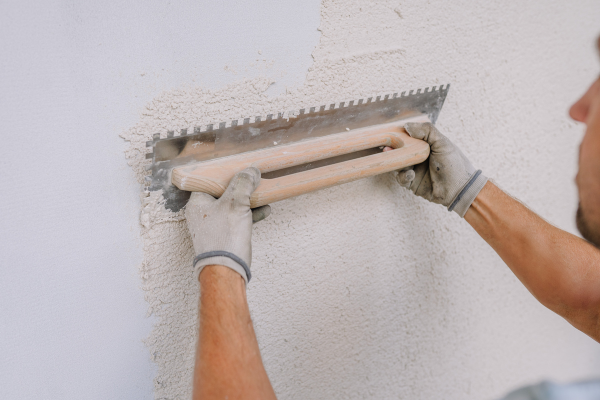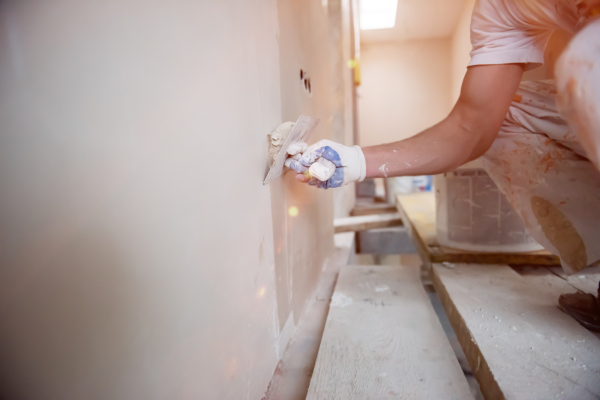Is the Plastering NVQ for Beginners?
The Plastering NVQ (National Vocational Qualification) is widely respected within the construction industry, because it signifies a plasterer’s competence, and adherence to professional standards. But who is the qualification actually for- and can beginners take it?
The short answer is no; NVQs are designed for those who are already working in their trade. They’re a way for professionals to validate their experience with a formal qualification.
In today’s blog, we’ll be looking at why exactly NVQs are not suitable for beginners, the amount of experience you typically need to take an NVQ, how the qualification is assessed, and more.

Who is the Plastering NVQ Designed For?
The NVQ (typically at Level 2 for skilled worker status) is fundamentally designed for those who are already actively working in the plastering trade. Its core purpose is to assess and validate existing competence gained through practical, on-the-job experience.
NVQs in Plastering are suited to those who have consistently applied plastering techniques in a real work environment, and are looking to obtain a formal, nationally recognised certification. The NVQ can also serve as a crucial milestone for apprentices who are nearing the completion of their structured training programme. By this stage, apprentices have typically gained sufficient practical experience to meet the rigorous assessment criteria.
Do You Need On-Site Experience Before Starting?
To reiterate, the NVQ is not a training course for beginners; it is, instead, an assessment of existing competence. This means that before you can even begin the NVQ assessment, you need to be able to do the job of a plasterer to an industry-standard level.
The qualification requires you to demonstrate practical skills in a live work environment. This necessitates hands-on experience with various plastering materials, techniques, and working conditions typically encountered on construction sites. Without this foundational and consistent on-site experience, you’ll find it exceptionally challenging to meet the assessment criteria for performing tasks proficiently and safely.
Can a Complete Beginner Take the Plastering NVQ?
No, a complete beginner shouldn’t (and wouldn’t be allowed to, by any reputable NVQ provider) attempt to take the NVQ. The very design of this qualification makes it unsuitable for individuals who have no prior experience in the trade. The NVQ framework is built upon the principle of assessing existing occupational competence, requiring candidates to demonstrate their skills in a real working environment, consistently and to a professional standard.
A beginner would lack the necessary practical skills, and accumulated experience, to perform the tasks required for the assessment units. The NVQ process involves remote observations of your work, the compilation of a digital portfolio based on real jobs you’re involved in, and professional discussions that draw upon practical problem-solving scenarios. Without the ability to perform these tasks, a beginner would have no evidence to present, and would struggle to meet the strict criteria for competency. Luckily, providers like CST Training offer guidance to candidates on which qualifications would be most appropriate.
What Training Options Are Available for Those New to Plastering?
For complete beginners eager to embark on a career in plastering, there are several effective training options available that provide the foundational knowledge and practical skills necessary to eventually pursue an NVQ. The most common and highly recommended route is a Plastering Apprenticeship. Apprenticeships offer a comprehensive blend of paid on-the-job training (where you gain practical skills by working alongside experienced plasterers) and off-the-job learning (attending college or a dedicated training centre for theoretical instruction and workshop practice). This structured approach allows beginners to develop skills gradually, receive mentorship, and build up the necessary practical experience over a period of usually 2-3 years.
Alternatively, many colleges and dedicated training centres offer full-time or part-time diplomas or certificates in Plastering (e.g., Level 1 or Level 2 Diploma). These courses provide structured classroom learning combined with extensive practical workshop sessions, equipping beginners with the core techniques, material knowledge, and safety practices required to enter the industry. While these don’t immediately lead to an NVQ (as they are typically classroom-based, not workplace-based assessments), they provide the essential practical groundwork that makes an NVQ achievable once sufficient workplace experience is gained through subsequent employment. These foundational courses can be an ideal starting point for anyone new to the trade.
How is the Plastering NVQ Assessed?
The assessment for the NVQ is designed to be entirely workplace-based, focusing on your ability to perform tasks competently and safely in a real-world setting. You won’t sit exams in a classroom environment.
Instead, a qualified NVQ assessor will work closely with you throughout the process. They will conduct remote observations of you performing a range of plastering tasks on active construction sites or similar working environments. The assessor will be scrutinising your techniques, adherence to safety protocols, efficiency, and the overall quality of your finished work under realistic conditions.
You’ll also be required to compile a comprehensive portfolio of evidence. This portfolio will contain various documents, photographs, and video recordings generated from your actual work, all demonstrating your competence across the required units. Examples might include completed job sheets, risk assessments you’ve contributed to, and visual proof of your plastering applications.
Professional discussions with your assessor also tend to be a key component. These structured conversations allow you to articulate your understanding of specific plastering processes, explain your decision-making, and demonstrate your knowledge of industry standards and regulations.

Are There Entry-Level Routes That Lead to This NVQ?
While the NVQ itself is not for beginners, there are clear and established entry-level routes within the construction industry that are specifically designed to eventually lead to this NVQ. The most common and effective pathway is through an apprenticeship. A plastering apprenticeship provides a structured program where you gain hands-on experience working on real sites alongside experienced professionals, while also receiving formal training at a college or training centre.
What Skills Are Formalised Through the Plastering NVQ?
The NVQ serves to formally recognise and certify a comprehensive set of practical skills and underpinning knowledge that an experienced plasterer consistently applies in their daily work.
Firstly, it formalises your ability in surface preparation. This includes the crucial tasks of preparing various backgrounds for plastering or rendering, and applying necessary primers or key coats to ensure proper adhesion and a high-quality finish.
Secondly, the NVQ certifies your competence in various application techniques. This covers the skilled application of different plastering systems, including two-coat plasterwork to walls and ceilings, rendering external backgrounds to various finishes, and fixing plasterboard accurately and securely, ready for skimming or other finishes.
Beyond the core application, the qualification also formalises your understanding and adherence to health and safety practices specific to plastering. This includes working safely at heights, managing dust, handling materials safely, and ensuring your work environment is compliant with regulations.
Does the Plastering NVQ Help with Gaining a CSCS Card?
One of the most notable benefits of successfully completing the NVQ Level 2 is that it’s a huge step towards eligibility for the CSCS Blue Skilled Worker card. This card is a crucial credential for gaining access to most construction sites across the UK.
Employers widely recognise and often mandate the CSCS card as proof of a worker’s qualifications and their understanding of fundamental health and safety regulations. For a qualified plasterer, securing the Blue CSCS Card through the NVQ is essential for enhancing employability, ensuring consistent site access, and demonstrating their professionalism within the industry. Without this card, many reputable contractors will not allow you to work on their sites.
What Are the Common Challenges for New Starters?
For individuals new to plastering, several common challenges can arise when trying to gain the experience needed for an NVQ. Initially, finding opportunities to gain genuine hands-on experience can be difficult, as many contractors prefer already skilled workers. Mastering the nuanced techniques of plastering, such as achieving perfectly flat and smooth surfaces, requires significant practice and patience. Understanding the different materials, their drying times, and proper mixing ratios can also be a steep learning curve. Furthermore, the physical demands of the job, including repetitive movements and working with heavy materials, can be challenging. Finally, learning to work safely and efficiently on a busy construction site, integrating with other trades, requires time and experience.
How Long Does It Typically Take to Complete the Plastering NVQ?
The time it takes to complete the NVQ really just depends on the individual’s existing experience, their ability to gather evidence, and their engagement with the assessment process. There’s no fixed timetable like with traditional college courses.
For highly experienced plasterers who are already competently performing the required tasks on a daily basis, the NVQ can be completed pretty quickly. Many dedicated individuals, especially when supported by efficient training providers like CST Training, can achieve the qualification in a period of four to eight weeks. This timeframe is possible because the assessment is validating existing, demonstrable competence rather than teaching new skills from scratch.
For those with less direct experience, or who need more time to compile comprehensive evidence from their workplace, the process may extend to several months. The key is consistent interaction with your assessor and proactive evidence submission.
Conclusion
The NVQ is not suitable for beginners. It’s a robust, competency-based qualification, specifically designed to assess and certify existing competence gained through practical, on-the-job experience within the trade. It’s solely intended for individuals who can already confidently perform a wide range of plastering tasks safely, efficiently, and to industry standards.

If you still have any questions regarding the NVQ, then do not hesitate to get in touch.
Phone – 020 3488 4472





